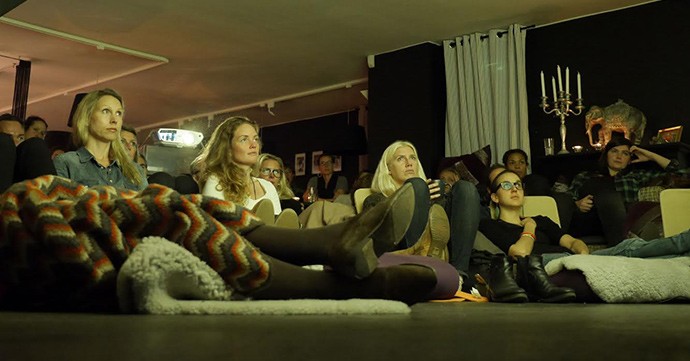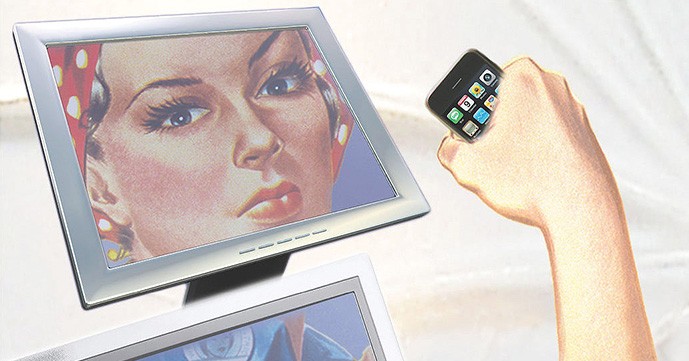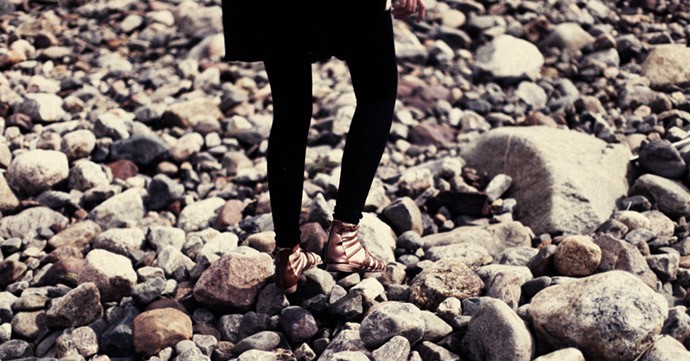
Up and running for more than a year, the Film Club run by Yogayama’s Gustav Roth and Johanna Nielsen focuses on bringing people together around documentary film, with an eye towards not just inspiring debate and discussion, but also inspiring club members to take action in their own lives, whether that’s on a personal level or on a larger scale. Sound familiar? We met with Gustav and Johanna to find out why they formed their monthly club and how it’s developed over time.
First things first: How did you get started?
Gustav Roth: I was working with documentaries and wanted to promote discussion and sharing around films. There had been occasional screenings at Yogayama before so it started quite casually. When we decided it should be a regular event we announced it through our newsletter, flyers as well as creating a Facebook event inviting people to the screenings. The response was amazing and we now get anywhere from 15 – 50 people attending each screening.
That’s fantastic! So how does the club work in practice? Does the amount or type of people influence how you run the discussion?
Johanna Nielsen: We want a more organised discussion so we view the films before screening them to the group and sometimes have discussion questions ready. Other times we just open up the discussion and let the group just run with it.
Gustav: Sometimes we put people into smaller groups, and this helps get things going. If it’s a really heavy film we give everyone an allotted amount of time to speak, which allows everyone a chance to express their opinion, which they usually want to do if it’s a big topic. It’s really about knowing how to read the group and understanding what will work best, depending on the film, the reaction, and other things.
So how do the discussions go? Do people get quite passionate? Disagree? Come to blows?
(laughter)
Gustav: Yeah, depending on the film discussion can be very passionate because people always have different opinions, but they’re respectful.
Johanna: What’s interesting is to see how opinions go with personality. You say to yourself, ‘Aha! That guy is very pragmatic or that person over there is pretty emotional.’ It really shows in how they respond to the documentaries, and it helps everyone see different layers in each film.
One of the last films we screened, THE CRASH REEL, really got people excited about the idea of your passion taking over your life and how that can imprison you – or not. It was a very lively discussion, but no, it didn’t come to blows!
Do you tend to choose films with weightier subject matters?
Johanna: We tend to choose documentaries that have more of a message, that people can take with them and maybe improve their lives in some way, whether that’s on a personal, local or bigger level. Small or big – it doesn’t matter.
So do people come away with inspiration to do something different in their lives? Do you see it actively happening?
Gustav: Yes and no. What’s good is that we have this discussion and I think that’s cool to see every time. There’s always a great discussion after the film and I think once people start talking almost everyone has something they need to share.
We’ve noticed that people get this ‘What can I do?’ feeling and we’re trying to find a way to help people put that feeling into action, to help them make a difference, to find inspiration.
Johanna: Documentaries are so impactful so if we inspire just one person, that’s great!
_________
Have you started your own Documentary Club yet? We’ve come up with our Ten Great Reasons to Start a Doc Club but we’re quite sure there are plenty more. You can learn more about starting a doc club here.

“Miss Representing” Women in Media and Politics
‘You can’t be what you can’t see.’ – Marie Wilson, The White House Project
In 1848 the Seneca Falls Convention broke new ground by being the first Women’s Rights convention ever held in the United States. In 1963 the United States Congress passed the Equal Pay Act. In 1964 The United States Congress banned sexual discrimination in the work place. Despite these advancements and many more, in 2014 gender equality remains a battleground.
The portrayal of women in the media plays a significant role in the struggle for gender equality, and MISS REPRESENTATION, a 2014 documentary addressing this issue, does not paint a pretty picture in terms of how far we have come. The way in which women are portrayed in the media has a direct impact on how women are perceived not just by men but by other women as well. The portrayal of women is overwhelmingly one-dimensional: sexualised and often infantilised, if a woman isn’t presented as youthful, beautiful, and infinitely desirable chances are she’s not being seen at all. And if a woman isn’t busy turning on the male viewer then she really has no positive value as far as the media is concerned.
This, in turn, impacts women’s ability to achieve their goals. If half the population is continually reduced to being little more than a sexual plaything then their ability to be seen – and to see themselves – as anything outside of that narrow spectrum is severely compromised. The result is that women struggle to be accepted as intelligent, competent individuals. Girls and younger women have it even worse: because they’re continually bombarded with the message that their worth is based almost exclusively on their youth, beauty and sexual attractiveness they tend to internalise that message, putting inordinate amounts of time and energy into living up to a severely limiting image to the detriment of setting and achieving real, long-term goals that have real value and substance.
While MISS REPRESENTATION focuses on TV, film, and advertising this highly sexualised portrayal of women is not limited to those spaces. And often it’s women who play a key role in perpetuating these expectations, even while declaring themselves empowered.
During Beyoncé’s recent On the Run tour with her husband Jay-Z, she gyrated in front of a huge sign flashing the word ‘feminism’. The media response was all over the map, with singer Annie Lennox calling it ‘tokenism’ and ‘feminism light’, while others gave Beyoncé props for being a powerful woman in a tough industry that is run by men. Others called her out for ‘performing for the male gaze’ and for stamping her husband’s surname on a creation that was all her own, positing that once again here was a woman pandering to the male expectations. Read one of the many reactions here.
Beyoncé isn’t by any means the first or the only modern woman to use her sexuality as part of her arsenal in the rise to power and success; anyone with access to the Internet or any other media could easily list dozens upon dozens of women who have taken the same route.
This leads to some interesting questions: does Beyoncé, or any other woman, not have the right to portray herself in any way she chooses? It would be difficult to argue that she isn’t in control of her sexuality or her choice to represent herself in a sexual manner. Why she makes these choices – and whether those choices are right or wrong – is up for debate, mainly because while many women prefer to be seen not as just a sexual plaything, there is no denying that we are all sexual beings. We want to be desired and fulfilled and that means different things to different people, with no one person or entity having the right to dictate how that should be done or what it means.
The main problem with portraying women solely as sexual beings is that any other point of value is ignored. With the media overwhelmingly controlled by men, women simply aren’t getting a fair shake; if a woman is driven, ambitious, smart, and successful she is often ripped to shreds and presented as a bitch, a harpy, or maybe just someone on her period. It is either implied or outright stated that a woman who isn’t first and foremost desirable to the male gaze is somehow unfeminine and of little value. Despite this – or maybe because of it – a woman’s sexuality is often used to ‘keep her in her place.
Emma Watson, undoubtedly the smartest witch or warlock in the Harry Potter films, recently spoke before the United Nations to launch the He for She campaign. She invited both men and women to come together and join her in the fight for equality, arguing that gender equality is necessary for everyone, male or female, and that both sexes benefit from a society that greets everyone on an equal basis.
Some women called her speech a simplistic, with all too obvious message. Some men said her speech was bad for men. Others hailed her for helping to reach a younger demographic, one that is continually bombarded with hyper-sexualised images of women. Read one reaction here. And yet another reaction was an anonymous group or individual threatening to released allegedly nude photos of her as part of the recent rounds of celebrity nude photo leaks which exclusively featured hacked, private photos of famous women in various stages of undress.
The take away from all of this is that once again women just can’t catch a break: if they speak out and demand (or even respectfully request) equality they are criticised for how they deliver the message and even the message itself. On the other hand some see women speaking out about equality as wrong in and of itself, a veritable call to arms to which the only response is threat of humiliation and exposure in an arena where they are deemed most vulnerable: their sexuality.
MISS REPRESENTATION makes a strong argument for creating balance when it comes to the portrayal of women in the media. Women are not either a Madonna or a whore, they are not an intellectual or a slut; women are multi-faceted creatures with the same wide spectrum of needs, desires and ambitions as their male counterparts.
If and when the American media begins to portray women as more than just a mom, or a daughter, or a plaything – as something more than just as an extension of a man in one way or another – all of society will benefit, because suddenly we will all be working at our optimal capacity, with brains, energy, and creativity of the entire population, not just half.
Written by Judi Lembke

“I am beginning to believe that we know everything, that all history, including the history of each family, is part of us, such that, when we hear any secret revealed, a secret about a grandfather, or uncle, or a secret about the battle of Dresden in 1945, our lives are made suddenly clearer to us. For perhaps we are like stones; our own history and the history of the world embedded in us, we hold a sorrow deep within and cannot weep until that history is sung.” —Susan Griffin
This playlist is all about family. No matter who we are or where we live, most of us were born into families and continually deal with family relationships of some sort, whether it’s with parents, mentors, partners, or children.
We’ve chosen 6 films that deal with family in some way:
Buck
A look inside the life of Buck Brannaman, a man with an almost surreal aptitude for communicating with horses. He overcame tremendous odds to become the real life ‘horse whisperer.’
Capturing the Friedmans
A seemingly average middle-class American family is turned upside down when the father and youngest son are charged with sexually abusing neighborhood children. Through a strange criminal case, we learn about the elusive nature of truth.
Cutie and the Boxer
A candid New York love story exploring the chaotic 40-year marriage of famed “boxing” painter, Ushio Shinohara, and his artist wife, Noriko. Anxious to shed her role as her overbearing husband’s assistant, Noriko finds an identity of her own.
Grey Gardens
Meet Big and Little Edie Beale—mother and daughter, high-society dropouts, reclusive cousins of Jackie O.—thriving together amid the decay and disorder of their ramshackle East Hampton mansion.
Stories We Tell
A highly original documentary that explores how we construct our own reality through stories. Sarah Polley’s family and friends weave different narratives into a complex portrait of her mother who died when Sarah was eleven.
The Crash Reel
A dramatic story of one unforgettable athlete: Kevin Pearce; one eye-popping sport: snowboarding; and one explosive issue: Traumatic Brain Injury. A comeback story with a difference.
If there’s anything these six films reveal, it’s that no two families look the same, but understanding one’s history is oftentimes the key to understanding one’s self.

Influence Film Club’s Top Documentaries of 2011 shows is a testament to the power of documentary film. These are real stories about real people (and our animal friends) that deserve to be seen and talked about. These docs tell the stories of David and Golliath, those who have redefined and stood up against cultural norms, people who have dedicated their lives to a passion, and those who remind us that there is more than meets the eyes. Our top documentaries of 2011 inspire us to be the change we want to see in the world, and invite meaningful discussions about the world immediately surrounding us and the world at large.
The Black Power Mixtape
Essential viewing to anyone concerned with contemporary U.S. history, THE BLACK POWER MIXTAPE is a compilation of footage shot by a group of Swedish journalists following the American Black Power Movement between 1967 and 1975.
Buck
A look inside the life of Buck Brannaman, a man with an almost surreal aptitude for communicating with horses. He overcame tremendous odds to become the real life ‘horse whisperer.’
If a Tree Falls
IF A TREE FALLS offers a rare and provocative look at the Earth Liberation Front, the radical environmental group that the FBI calls America’s number one domestic terrorist threat.
Pina
PINA is a visually stunning documentary featuring the ensemble at Tanztheater Wuppertal Pina Bausch. The film pays tribute to and reflects upon the unique and inspiring life and art of the great German choreographer, Pina Bausch, who died in the summer of 2009.
Project Nim
PROJECT NIM tells the story of a chimpanzee who was the focus of a 1970’s landmark experiment to prove that an ape could learn to communicate through sign language if raised and nurtured like a human child.
Big Boys Gone Bananas*
What is a big corporation capable of in order to protect its brand? BIG BOYS GONE BANANAS!* follows filmmaker Fredrik Gertten and his partners as they refuse to be bullied and silenced by the fruit giant, Dole Food Company.
Kumaré
KUMARÉ is a documentary about a man who impersonates a wise Indian Guru and builds a following in Arizona. At the height of his popularity, the Guru Kumaré must reveal his true identity to his disciples to unveil his greatest teaching of all.
Jiro Dreams of Sushi
JIRO DREAMS OF SUSHI is a thoughtful and elegant meditation on work, family, and the art of perfection, chronicling Jiro Ono’s life as both an unparalleled success in the culinary world and as a loving yet complicated father.
Miss Representation
By exploring the under-representation of women in positions of power and influence in America, MISS REPRESENTATION challenges the media’s limited portrayal of what it means to be a powerful woman.
Bully
BULLY is an intimate account on how bullying affects 13 million American children every year. Bringing human scale to this startling statistic, the film offers an unflinching look at how bullying has impacted 5 kids and their families.